ENGL 439-01 ("439b"): Love in Medieval
Literature
Fall, 2020 Online Quarter

- Synchronous Class Meetings over
Zoom: T/R 2:10-4:00 PM
- Virtual
Office Hours via Zoom: W
10:10-11:00 AM; Th 12:10-1:00 PM;
and by appointment
(Zoom Links provided via
email and on Canvas; please do NOT join zoom meetings
before scheduled meeting time) |
 |
Dr. Debora B. Schwartz
http://cola.calpoly.edu/~dschwart
Main English Office:
756-2597
e-mail: dschwart@calpoly.edu |

 Calendar of
Assignments Calendar of
Assignments
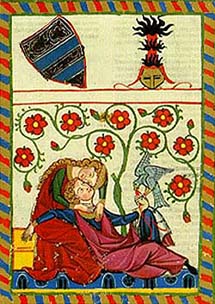 PLEASE NOTE that the on-line
syllabus (not any print-out you may
make) is authoritative. Assignments may
be modified in the course of the
quarter. Check the on-line syllabus
regularly (before each class) to ensure that
you are completing the correct assignment. It
is accessible at http://cla.calpoly.edu/~dschwart/engl439/439syllf17.html PLEASE NOTE that the on-line
syllabus (not any print-out you may
make) is authoritative. Assignments may
be modified in the course of the
quarter. Check the on-line syllabus
regularly (before each class) to ensure that
you are completing the correct assignment. It
is accessible at http://cla.calpoly.edu/~dschwart/engl439/439syllf17.html
Oral
Presentation Schedule
MyCalpoly
Portal (log-in for PolyLearn and
Kennedy Library Research Tool Access)
Required and Recommended Readings
|
 |
Site Navigation
|

 Prerequisites:
Enrollment in ENGL 439 is limited to English majors
and English Graduate Students. English majors are normally
expected to have completed ENGL 203, the
Medieval Core class, which is a prerequisite for
upper-division work in medieval literature. Because
it builds on the knowledge acquired in the Medieval Core
class, ENGL 439 Love in Medieval Literature should not
normally be undertaken by undergraduate English majors who
have not yet completed ENGL 203. Prerequisites:
Enrollment in ENGL 439 is limited to English majors
and English Graduate Students. English majors are normally
expected to have completed ENGL 203, the
Medieval Core class, which is a prerequisite for
upper-division work in medieval literature. Because
it builds on the knowledge acquired in the Medieval Core
class, ENGL 439 Love in Medieval Literature should not
normally be undertaken by undergraduate English majors who
have not yet completed ENGL 203.
Note: While 400-level seminars are generally taken by
juniors and seniors, because this variable-topic course
is offered only once every two to three years,
interested sophomores who have completed ENGL 203 occasionally
take this seminar. Successful completion of ENGL
203 should be adequate preparation for this class.

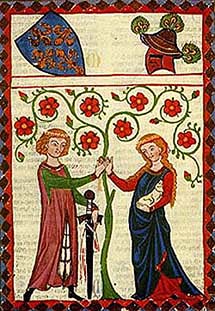 Course Description and
Objectives: This course explores
the literary treatment of love of many types --
erotic, romantic, bawdy, spiritual, familial, as well as
the intersections between them -- in the vernacular
literature of the Middle Ages. Starting with
selections from the the Latin work of Ovid, the
classical (Roman) poet who most influenced the depiction
of love in medieval works, we will explore the
intersection of different types of love in both
canonical and lesser known literature. Along the
way, we will consider how gender influences the
depiction of literary love, considering how both how
women's voices and perspectives are "heard" in medieval
texts (authored by both men and women) and the ways in
which these texts contribute to and reflect the gender
expectations of their authors and audiences.
Medieval readings will be paired with appropriate
theoretical and critical essays. Course Description and
Objectives: This course explores
the literary treatment of love of many types --
erotic, romantic, bawdy, spiritual, familial, as well as
the intersections between them -- in the vernacular
literature of the Middle Ages. Starting with
selections from the the Latin work of Ovid, the
classical (Roman) poet who most influenced the depiction
of love in medieval works, we will explore the
intersection of different types of love in both
canonical and lesser known literature. Along the
way, we will consider how gender influences the
depiction of literary love, considering how both how
women's voices and perspectives are "heard" in medieval
texts (authored by both men and women) and the ways in
which these texts contribute to and reflect the gender
expectations of their authors and audiences.
Medieval readings will be paired with appropriate
theoretical and critical essays.
Readings have been chosen to allow us to compare the
depiction of love in works written by women (e.g. Marie
de France, Christine de Pizan, Julian of Norwich,
Margery Kempe) and men (e.g. Chrétien de Troyes,
Guillaume de Lorris, Jean de Meun, Dante, the Pearl Poet
and Chaucer). In addition to canonical works, we
will consider lesser known works and works of unknown
authorship. These works have been chosen both for
their intrinsic interest and for how they spotlight
attitudes towards various types of love at the time when
they were written. Particular attention will be
paid to the intersection between erotic and spiritual
love and between didactic works and literary
entertainments. Through these readings, we will
examine medieval beliefs concerning love in all of its
forms as well as the tension between secular and
religious values and ideals. Finally, we will touch on
questions of historical context, discussing intellectual
(university) attitudes towards courtly literature,
women's access to education and literacy, the legal
status of women during the periods we are considering,
and differences between medieval and modern notions of
authorship and of "originality."
I hope that exploring the
treatment of love in medieval literary works will
cause you to (re)consider your own assumptions about
love and sharpen your sensitivity to the ways in which
love is constructed in more recent periods and
literary works.
 Required
Textbooks: you MUST
use the following textbooks -- not
another edition or translation -- in
this class. Required textbooks are
listed in the order in which they are
used; order NOW to be sure you have them
on time! All of these texts should
be available for purchase at the
University Bookstore, or you may purchase
them from another source (try Bookfinder.com
for inexpensive used copies).
Readings in required textbooks are
indicated on the Calendar of Assignments
using the following abbreviations: Required
Textbooks: you MUST
use the following textbooks -- not
another edition or translation -- in
this class. Required textbooks are
listed in the order in which they are
used; order NOW to be sure you have them
on time! All of these texts should
be available for purchase at the
University Bookstore, or you may purchase
them from another source (try Bookfinder.com
for inexpensive used copies).
Readings in required textbooks are
indicated on the Calendar of Assignments
using the following abbreviations:
- Ovid = Ovid, The Love Poems,
trans. A.D. Melville (Oxford World's
Classics); needed Wk
2. Available at Bookfinder.com
or Amazon.com.
- Andreas = Andreas Capellanus, The
Art of Courtly Love, trans. John
Jay Parry (Columbia UP); needed Wk
2. Available at Bookfinder.com
or Amazon.com.
- Marie = The Lais
of Marie de France, trans.
Robert Hanning and Joan Ferrante (Baker
Books); needed Wk
3. Available at Bookfinder.com
or Amazon.com.
- Chrétien =
Chrétien de Troyes, Arthurian
Romances, trans. William W.
Kibler and Carleton W. Carroll (Penguin
Classics); needed Wk
3. Available at Bookfinder.com
or Amazon.com.
- Rose = The
Romance of the Rose, trans.
Frances Horgan (Oxford World Classics);
needed Wk
5. Available at Bookfinder.com
(choose a US bookseller for
faster delivery) or Amazon.com.
- Dante = The
Portable Dante, ed./trans.
Mark Musa (Viking-Penguin); needed
Wk
5. Available at Bookfinder.com
or Amazon.com.
- PC = The
Portable Chaucer, ed./trans.
Theodore Morrison (Viking-Penguin);
needed Wk.
6. Available at Bookfinder.com
or Amazon.com.
RECOMMENDED
TEXTBOOKS: If you
prefer actual books over reading online or
printing out .PDF files, the specific
translations used in our class are
available at the links below. NOTE: If you
present / write on a work from which we
are only reading selections (e.g. Malory;
Julian of Norwich; Margery Kempe), I
recommend getting a copy of the full text.
- Ovid's Metamorphoses,
trans. A. D. Melville (Oxford World
Classics); needed Wk
2. Available at Bookfinder.com
or Amazon.com.
- Joseph Bedier's The Romance
of Tristan and Iseult, a modern
retelling based upon a compilation of
various medieval sources, is a quick and
highly enjoyable read (recommended for ENGL
439; required for ENGL
459, Love and Death: The Tristan Tradition,
next offered S21). Needed Wk
3. Available at Bookfinder.com
or Amazon.com.
- Malory, volume 2 of the two-volume
Penguin Classics Morte Darthure;
needed Wk
4. Available at Bookfinder.com
or Amazon.com.
- The Gawain Poet: Complete Works,
trans. Marie Boroff (Norton); this volume
includes both Sir Gawain and the Green
Knight, needed Wk.
4, and Pearl, needed Wk
. 7. Available at Bookfinder.com
or Amazon.com.
- If you don't mind reading Sir Gawain
and the Green Knight in the .PDF on
e-reserve, you can pick up Marie Boroff's
translation of Pearl (needed
Wk.
6) in the stand-alone volume from
which our e-reserve readings were scanned;
available at Bookfinder.com
or Amazon.com.
- Christine = The Selected
Writings of Christine de Pizan, trans.
Renate Blumenfeld-Kosinski and Kevin
Brownlee (Norton Critical Edition); this
textbook is recommended for ENGL
203 and required for ENGL
439, Gender in Medieval Literature
(likely to be taught again next year).
Needed Wk
5. Available at Bookfinder.com
or Amazon.com.
- Anchoritic Spirituality: Ancrene
Wisse and Associated Works,
trans. Anne Savage and Nicholas Watson
(Paulist Press; also includes assigned
reading Hali Meidhad and The
Wooing of the Lord); needed Wk.
6. Available from Bookfinder.com
or Amazon.com.
- If you work on Julian of Norwich,
you will want a translation of the full text
(we are reading only Norton Anthology
selections week
6). Pick up The
Revelations of Divine Love,
trans. Elizabeth Spearing (Penguin
Classics); available at Bookfinder.com
or Amazon.com.
- If you work on Margery Kempe, you will
want a translation of the full text (we are
reading only Norton Anthology
selections week
6). Pick up The Book of
Margery Kempe, trans. Barry
Windeatt (Penguin Classics); available at Bookfinder.com
or Amazon.com.
Note: you must use the SPECIFIC
TEXTS ordered for this class. DO NOT
SUBSTITUTE another edition / translation!
Other required
readings will be accessed electronically,
as .HTML files through links on this website, or
as .PDF files that have been placed on "electronic
reserve" on PolyLearn. Please note that
ALL required electronically accessed readings
should be PRINTED OUT, PLACED IN A COURSE
BINDER, AND BROUGHT WITH YOU TO CLASS. To access PolyLearn,
log in at MyCalpoly,
go to "My Courses" and click on the PolyLearn
link for ENGL 439. Click on the links in
the Electronic Reserves section to download,
read and/or print the .PDF files using Acrobat
Reader. To
access online readings in .html files,
click on the link on the Calendar
of Assignments. ALWAYS BRING
HARD COPY OF ASSIGNED TEXTS WITH YOU TO CLASS! |
|

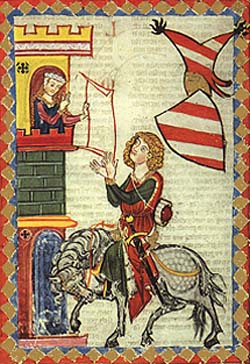 Communication:
You are expected to have an email
account and to check it regularly. Important
announcements will be sent over the class
email alias:
engl-439-01-2198@calpoly.edu . The class
email alias is automatically generated using the email
address of each enrolled student found in the Cal Poly
Directory server. If your Cal Poly email account is NOT
your preferred email address, you must Communication:
You are expected to have an email
account and to check it regularly. Important
announcements will be sent over the class
email alias:
engl-439-01-2198@calpoly.edu . The class
email alias is automatically generated using the email
address of each enrolled student found in the Cal Poly
Directory server. If your Cal Poly email account is NOT
your preferred email address, you must
- Log into http://my.calpoly.edu/
and click on "Grades and Personal Information" (the
"Personal Information Channel") to change your
Email Delivery Address. Once you have done so,
any email sent to your <username@calpoly.edu>
, including all postings to the class alias, will be
forwarded to the address you have designated.
Remember: you are responsible for any information sent
over the class email alias (e.g. changes in
assignments; other class-related announcements), so be
sure to check your email regularly.
You are also expected to
facilitate collaboration with your classmates by
promptly submitting reports
to the Class Research Archive listing the works
you have checked out of the Kennedy Library or ordered
from another OneSearch Library or from ILL , as well as
by submitting at least one item to the Class ILL Article Repository.
The Class Research Archives and ILL Article Depository
are located in PolyLearn. There will be separate pages
to list Kennedy Library Check-Outs, Orders from other
CSU OneSearch Libraries, and ILLorders, as well as a
forum for each author/text on which there are oral
presentations. If you have trouble posting to your
research archive, contact the Help Desk (756-7000) and
let me know at our next class meeting. Your complete set
of Research Postings and
your submission(s) to the ILL Article Repository will
factor into the participation
component of your final course grade.

 Attendance
Policy: Due to the twice-weekly
seminar format, any absence causes you to miss a
substantial chunk of material. Regular and
punctual attendance is required.
Please note that EVERY absence will affect the participation component of
your final course grade. Attendance
Policy: Due to the twice-weekly
seminar format, any absence causes you to miss a
substantial chunk of material. Regular and
punctual attendance is required.
Please note that EVERY absence will affect the participation component of
your final course grade.
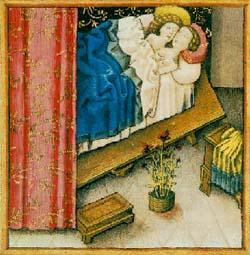 Each student starts out with a 4.0 for
attendance. This component of your final grade
drops by .3 for the first UNEXCUSED absence; the
penalty increases by .1 for each subsequent unexcused
absence (from A [4.0] to A- [3.7] to B+ [3.3], to B-
[2.8], etc.). Additionally, it drops .1 for the first
EXCUSED absence (4.0 to 3.9) and .2 for the second
excused absence (3.9 to 3.7). Excused
absences in excess of two (a full week, 10% of
the class) count the same as unexcused absences. Each student starts out with a 4.0 for
attendance. This component of your final grade
drops by .3 for the first UNEXCUSED absence; the
penalty increases by .1 for each subsequent unexcused
absence (from A [4.0] to A- [3.7] to B+ [3.3], to B-
[2.8], etc.). Additionally, it drops .1 for the first
EXCUSED absence (4.0 to 3.9) and .2 for the second
excused absence (3.9 to 3.7). Excused
absences in excess of two (a full week, 10% of
the class) count the same as unexcused absences.
Please note that only absences resulting from
illness, a family emergency, or circumstances truly
beyond your control count as excused.
Absences taken for personal convenience are a matter of
choice rather than necessity; they will be recorded as unexcused.
Please note that deadlines for other courses, work
conflicts and job interviews are NOT valid reasons for
missing class. Exception: a graduating
senior will be granted ONE excused absence for an out-of-town
job interview.
FOR ANY ABSENCE TO BE EXCUSED, YOU MUST
SUBMIT A SIGNED, WRITTEN NOTE with course number, date
missed and an explanation of the circumstances leading
to your absence. (An e-mail or a phone message
will not suffice; a written statement with
your signature is required for an absence to be
excused.)

Participation: in
addition to regular class attendance, the
participation component of the class grade will
reflect two sorts of online participation.
- You will be
assigned to a PolyLearn discussion group
of 6-8 students to which you will post short
reactions to / reflections on the assigned
readings. Each week, you will be expected to
post a response of at least one paragraph to at
least one assigned reading, and to post a
thoughtful response of at least one paragraph to
at least two of your classmates. These
postings will be graded pass/fail only and will be
factored into the participation portion of your
final course grade.
- You are also also
expected to collaborate with your
classmates by submitting research progress
reports and records
of works checked out from the Kennedy Library,
ordered from another CSU Library via OneSearch,
or ordered from ILL, to the class research
archive. There will be separate forums
for each author/text. Additionally, there will be
an ILL Repository to which you will upload
Interlibrary Loan articles you have received
electronically, and a central Other OneSearch
Library Orders Forum where you should
promptly post a list of books ordered from
other OneSearch Libraries to avoid
classmates placing duplicate orders.
Your complete set of Research Progress
Reports will factor into the participation
component of your final
course grade. Every missing post
counts as an Unexcused Absence and will
impact the 20% of
your final course grade that is based
on Participation and Collaboration.

 Preparation: Preparation:
Readings are to be completed BEFORE coming to class on
the date assigned. You are expected as a matter of
course to read assigned secondary readings (online readings,
introductions in the textbooks, and any supplemental
readings placed on e-reserve
in PolyLearn). When possible, try to read the background
material FIRST -- it provides a context within which the
primary readings will be more meaningful. But when time
is short, concentrate on getting through the primary
readings which will be the focus of class discussion;
you can always make up the background readings
later. 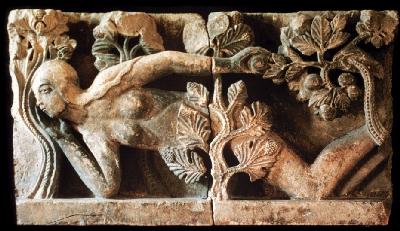
Be prepared to DISCUSS assigned readings in class. Note
that the length and difficulty of assignments vary, so
look ahead on the calendar of
assignments when you are planning your time. You
will be responsible for ALL the assigned readings,
whether fully discussed in class or not, as well as for
any additional background material presented in lectures
or student presentations. ALWAYS PRINT OUT
SUPPLEMENTAL READINGS AND BRING THEM WITH YOU TO
CLASS!!
Don't give in to the
temptation to procrastinate!! Be aware that
the research component
of this course requires additional preparation which
CANNOT be left until the week before your oral
presentation or prospectus is due. To get started,
come to an Office Hour (or
make an appointment to see me) by the end of week 4
at the latest. We will use this initial
meeting to brainstorm, to discuss possible topics and
approaches, to help you get the hang of some of the online
research
tools, and/or simply to get acquainted.
After this initial meeting, feel free to come back
whenever you feel you would benefit from additional
consultation. This means: if you feel confused or
overwhelmed, don't despair; CONTACT ME and
let me help you troubleshoot!

 Graded Work: Graded Work:
 RESEARCH EXERCISES and REPORTS to the
CLASS RESEARCH ARCHIVE:
Individual research meetings will help you begin your
research for your oral
presentation and your final
paper. Research progress reports
must be posted to a class Research
Archive on each text to serve as a "roadmap" for
anyone who wishes to incorporate the text you have
researched into the final project. Because your RESEARCH
PROGRESS REPORTS will be an important resource for
your classmates, they factor into your participation grade. RESEARCH EXERCISES and REPORTS to the
CLASS RESEARCH ARCHIVE:
Individual research meetings will help you begin your
research for your oral
presentation and your final
paper. Research progress reports
must be posted to a class Research
Archive on each text to serve as a "roadmap" for
anyone who wishes to incorporate the text you have
researched into the final project. Because your RESEARCH
PROGRESS REPORTS will be an important resource for
your classmates, they factor into your participation grade.
There will also be three
collaborative forums where you should post a list of
items you have checked out from Kennedy Library
collections, ordered through Other OneSearch
Libraries, and ordered from ILL. This
last forum will be an ILL Repository where you
will upload Interlibrary Loan articles you
have received electronically. The ILL
Repository, Kennedy Library Check-outs
and Other OneSearch Library Orders forums will
allow seminar participants to pool their resources and
"share the wealth" without recalling each other's books
or wasting the library's limited financial resources by
placing multiple Interlibrary Loan and OneSearch Library
requests for the same items. Because they are an
important resource for your classmates, they factor into
your participation and
collaboration grade.
Initial Research
Meeting: All students must meet with me by
the end of week 3 of the quarter -- after
having read (or at least skimmed) the text they will be
presenting in class -- to discuss possible angles for
the research presentation and to identify some useful
secondary sources on your topic. 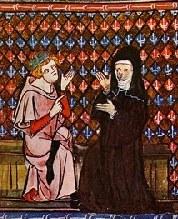 This initial meeting must
take place by the end of week 3 at the latest.
Failure to schedule and attend a research meeting by the
end of week 3 will result in a grade of "F" being
averaged into the Participation and Collaboration
component of the final course grade. This initial meeting must
take place by the end of week 3 at the latest.
Failure to schedule and attend a research meeting by the
end of week 3 will result in a grade of "F" being
averaged into the Participation and Collaboration
component of the final course grade.
NOTE to the research-challenged: I'm here to help!
At our initial meeting, I will assist you in getting the
research ball rolling. If you are worried
about the research component of this seminar:
- Get started early -- BEFORE our initial
research meeting by the end of week 3.
- After our initial meeting, keep at it
-- DO NOT put off the remainder of your
research until the week before your
presentation!
- SEE ME for help trouble-shooting any
problems you may have; and
- POST YOUR REPORTS to the appropriate
archives and UPLOAD YOUR ILL ARTICLES in a
timely manner so that they can be of benefit
to both you and your classmates!
Please endeavor to complete your research postings as
early as possible. And COME SEE ME if you are having
difficulty finding what you need!
ORAL PRESENTATION:
Starting in week two, assigned primary readings will
be introduced by one or more students (sign-ups the
first full week of class). This ORAL PRESENTATION
(no more than 20 min. per student!) should take
us into the medieval text and help us see something you
find interesting. Oral Presentations are the
starting point for class discussion, led jointly by
presenters and professor. Presentations should use close
reading (quoting passages from the medieval text) to
make an argument about or illuminate an aspect of the
reading, suggesting one or more critical, thematic,
stylistic or structural approach(es) to the work (or to
one or more of its episodes, motifs or characters). Your
oral presentation should NOT focus on the arguments made
in the secondary sources you have read (that's what your
Annotated Bibliography is for). Instead, you will
use close reading of the medieval text to help your
classmates see something interesting in the primary
work (i.e. the assigned medieval literary text).
Students are encouraged (but not required) to develop
this presentation topic more fully in the final research paper. Please note: you are
NOT expected to become a world expert on your assigned
topic; you are merely responsible for helping to
introduce it to your classmates! Click on link for the ORAL
PRESENTATION SCHEDULE.
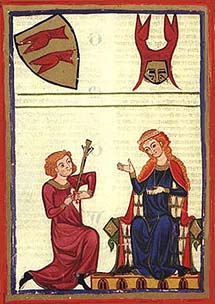
Each presenter will prepare
and distribute an ANNOTATED
BIBLIOGRAPHY of at least five secondary
sources dealing with the primary reading
(including any essay or article presented in class).
Entries should be alphabetized as on a List of Works
Cited and should begin with a full
bibliographic citation in TRADITIONAL (old) MLA
format (consult the models on the Guide to
Research Tools and pages of the MLA Handbook
on e-reserve for correct traditional MLA format!) The
annotation should be a brief summary of the primary
thrust of the article, essay or book (what it argues
about your medieval text/author -- not
praise for or a critique of the article, essay or book).
Be sure to include at least one of each of the following
types of resources: journal
article, essay in an edited book collection,
and single-author book. At least one of
the listed items must have been obtained using each of
the following modes of access: an item
found in hard copy at the Kennedy Library (state
"Cal Poly" and give call number in parentheses at end of
annotation; don't neglect to consult the items on Reserve
for this class!); an electronically
accessed source (ebook or journal article in a
subscription database in the Kennedy Library
collections; a hard-copy source ordered
from another CSU Library using OneSearch;
and an item ordered from ILL (typically a journal
article not available electronically at the Kennedy
Library). The Annotated
Bibliography will be graded for complete and correct
TRADITIONAL bibliographic
citations; for the distribution of items over
the required types of
sources and modes of
access; and for the prose expression and amount
of specific detail in the summary.
Your Oral Presentation
and Annotated
Bibliography count toward your in-class work grade.
Please note: you
should start researching your topic as soon as you
have selected it in order to obtain
helpful and appropriate materials from other CSU+
OneSearch Libraries and from ILL
. You should meet with Prof.
Schwartz (and other presenters on same text, if
applicable) no later than the third week of
class for bibliographic suggestions and to
discuss possible approaches / topics for your
presentation. Failure to schedule and attend a
research meeting by the end of week 3 will result in a
grade of "F" being averaged into the Participation
and Collaboration component of the final course
grade.
 PAPER
PROSPECTUS: Normally ungraded; due
DUE in class on Thursday 10/31/19, or via
email attachment by midnight on SUNDAY 11/3/19, as a .docx
file with the file name
"[yourlastname]439prospectus.doc". Prospectus
must include a working title which clearly
identifies the primary work(s) discussed as well as
topic of your paper; a fully articulated statement
of claims (not just a statement of general topic);
a tentative outline of paper; and a working
bibliography of at least eight sources
(alphabetized and in traditional MLA bibliographic
citation format; consult the models on the Guide to
Research Tools). NOTE:
If an acceptable Prospectus is submitted on
time, it will be used solely for feedback to help
you write a stronger final research paper. But if
no prospectus is submitted or the prospectus
does not fulfill the requirements of the assignment,
it will be graded and will count for 10% of your final course grade.
In that case ONLY, the Research Paper component of your
final grade will decrease to 20%. (Note: failure
to submit a prospectus will result in 10% of your final
course grade = F.) PAPER
PROSPECTUS: Normally ungraded; due
DUE in class on Thursday 10/31/19, or via
email attachment by midnight on SUNDAY 11/3/19, as a .docx
file with the file name
"[yourlastname]439prospectus.doc". Prospectus
must include a working title which clearly
identifies the primary work(s) discussed as well as
topic of your paper; a fully articulated statement
of claims (not just a statement of general topic);
a tentative outline of paper; and a working
bibliography of at least eight sources
(alphabetized and in traditional MLA bibliographic
citation format; consult the models on the Guide to
Research Tools). NOTE:
If an acceptable Prospectus is submitted on
time, it will be used solely for feedback to help
you write a stronger final research paper. But if
no prospectus is submitted or the prospectus
does not fulfill the requirements of the assignment,
it will be graded and will count for 10% of your final course grade.
In that case ONLY, the Research Paper component of your
final grade will decrease to 20%. (Note: failure
to submit a prospectus will result in 10% of your final
course grade = F.)
RESEARCH PAPER: 12-15
pp. long, citing at least 6 secondary
sources. Final paper may be connected to
the oral presentation. Due either
in hard copy at our last class meeting or
may be submitted via email attachment by midnight
on Sunday, December 8. Please save your paper and
list of Works Cited as a single Word file (.docx) under
the filename "[yourlastname]439paperF20.docx"
Worth 30% of final course
grade (except as noted above).
FINAL ORAL
EXERCISE: there will be
a required Final Oral Exercise: a brief
presentation to your classmates of the premise and
conclusions of your final research paper. While
the Final Oral Presentation is graded Pass/Fail, it is
the culmination of the collaborative work of the
seminar. For this reason, failure to
participate in the Final Oral Exercise will result
in a grade of "F" being averaged with your Midterm Exam score. The
Final Oral Exercise is typically held at my home in
conjunction with an (optional) Class Dinner during
the scheduled final exam time (7:10 PM - 10:00 PM on
Thursday, 12/12/19).

 Course Grade
Calculation: Course Grade
Calculation:
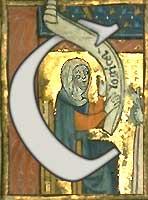 |
20% |
Participation and Collaboration
(including attendance,
Discussion Board postings, archived research
reports, uploads to the class ILL Article
Repository) and postings in the "Kennedy
Library Check-outs" and "Other OneSearch Library
orders" forums. NOTE: failure to meet with
Dr. Schwartz concerning your research
topic by the end of week three at the latest
will result in an "F" being averaged
into this portion of your course grade!
|
| 20% |
In-class
work: equal weight to Oral
Presentation and annotated
bibliography. (Should I determine
that reading quizzes are
necessary to ensure class members are keeping up
with assignments, they will be factored into
this portion of the final grade.) |
| 30% |
Exam(s).
NOTE 1: Failure
to participate in the final
oral exercise will result in an F being
averaged with this grade. NOTE 2:
if there is a written
final exam (in lieu of or in addition to a
class dinner/lunch), the final exam points will
be factored into this portion of the class
grade. |
| 30% |
Research
Paper. NOTE: If an acceptable
Research
Paper
Prospectus is submitted on
time, it will be considered an ungraded
exercise designed solely to provide feedback to
help you write a stronger final paper. But
if the prospectus submitted does not
fulfill the requirements of the assignment, or
if it is submitted late, it will be
graded and will count for 10% of your final
course grade. In that case, the research
paper itself will be worth only 20%. NOTE:
Failure to submit a prospectus that adheres
to assignment guidelines will result in
10% of your final course grade = F!! |

OH MY
GOSH . . . CAN I HANDLE THIS SEMINAR??
Sure you can -- if you keep up with the readings
and don't put off starting your research!
But DON'T assume that the class will "take care of
itself." If you have a heavy course- and/or
work-load, please be sure to budget time for this
class . . . Finally. . . remember that
I LOVE teaching this stuff, and I'm told that my
enthusiasm makes my classes more fun!
And WHAT ABOUT THOSE TWO-HOUR
BLOCKS?
Rest assured, we'll take a break each day. Feel
free to bring along a caffeinated (or non-caffeinated)
drink -- whatever it takes to keep you alert through two
hours. If there is sufficient interest, rotating
cookie duty will be arranged!
WELCOME, AND ENJOY!!!


Contents of this and linked pages on Cal Poly
websites Copyright Debora B. Schwartz, 1999-2020; last
updated 9/12/20
|
 PLEASE NOTE that the on-line
syllabus (not any print-out you may
make) is authoritative. Assignments may
be modified in the course of the
quarter. Check the on-line syllabus
regularly (before each class) to ensure that
you are completing the correct assignment. It
is accessible at http://cla.calpoly.edu/~dschwart/engl439/439syllf17.html
PLEASE NOTE that the on-line
syllabus (not any print-out you may
make) is authoritative. Assignments may
be modified in the course of the
quarter. Check the on-line syllabus
regularly (before each class) to ensure that
you are completing the correct assignment. It
is accessible at http://cla.calpoly.edu/~dschwart/engl439/439syllf17.html
 Course Description and
Objectives: This course explores
the literary treatment of love of many types --
erotic, romantic, bawdy, spiritual, familial, as well as
the intersections between them -- in the vernacular
literature of the Middle Ages. Starting with
selections from the the Latin work of Ovid, the
classical (Roman) poet who most influenced the depiction
of love in medieval works, we will explore the
intersection of different types of love in both
canonical and lesser known literature. Along the
way, we will consider how gender influences the
depiction of literary love, considering how both how
women's voices and perspectives are "heard" in medieval
texts (authored by both men and women) and the ways in
which these texts contribute to and reflect the gender
expectations of their authors and audiences.
Medieval readings will be paired with appropriate
theoretical and critical essays.
Course Description and
Objectives: This course explores
the literary treatment of love of many types --
erotic, romantic, bawdy, spiritual, familial, as well as
the intersections between them -- in the vernacular
literature of the Middle Ages. Starting with
selections from the the Latin work of Ovid, the
classical (Roman) poet who most influenced the depiction
of love in medieval works, we will explore the
intersection of different types of love in both
canonical and lesser known literature. Along the
way, we will consider how gender influences the
depiction of literary love, considering how both how
women's voices and perspectives are "heard" in medieval
texts (authored by both men and women) and the ways in
which these texts contribute to and reflect the gender
expectations of their authors and audiences.
Medieval readings will be paired with appropriate
theoretical and critical essays.  Required
Textbooks:
Required
Textbooks:  Communication:
You are expected to have an email
account and to check it regularly. Important
announcements will be sent over the class
email alias:
Communication:
You are expected to have an email
account and to check it regularly. Important
announcements will be sent over the class
email alias:  RESEARCH EXERCISES and REPORTS to the
RESEARCH EXERCISES and REPORTS to the

 Of Related Interest:
Of Related Interest:
